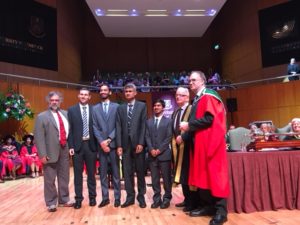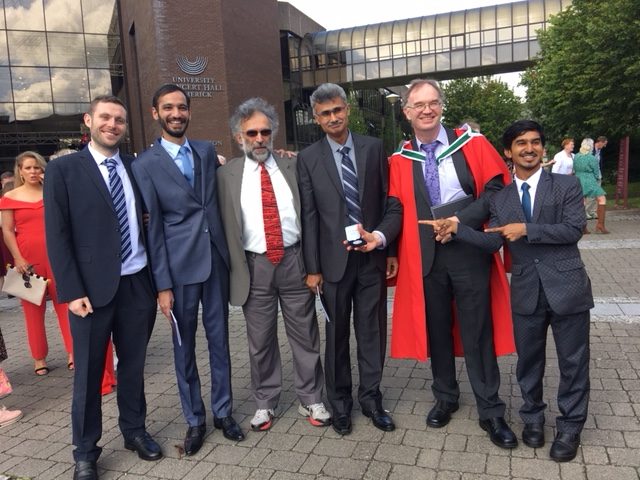University of Limerick
Presentation of the Excellence in Teaching Award August 26, 2019
By Lucia Valente
We are passionate about education – and not just any education. Our passion entails a firm commitment to open access – by those who want to learn – to top quality 21st century education. And that is not just platitudes – it is what drives us forward. And we don’t just talk about it – we are working on it now. And we want to do more.
Earlier this year, Professor Conor Ryan, of University of Limerick confirmed that his application for the Excellence in Teaching Award was successful. Professor Ryan and the LoG/CCN team designed, developed and deployed the CS4221: Foundations of Computer Science course for first year students.
Muhammad, who is a member of the team working on the University of Limerick project, lives in Kano, Nigeria. Muhammed received training from LoG over the last several months. All of his training is being done virtually through online webinars. Our methodology is so successful that within several months, Muhammad is in a position to work directly with Professor Ryan and his team in the deployment of CS4221: Foundations of Computer Science. For the LoG team, this is the realization of our vision
Break down barriers to learning whether financial, access, geographic, disability or other restriction.
Make available to any teacher, any student, anywhere, the most advanced computational education using Cloud Technology on inexpensive mobile devices: rapidly propelling and accelerating learning and retention of concepts.
Our mission
Make available to all Students/Learners Advanced Computational Educational Modules for analytical sciences in any geographic location or environments where there are access restrictions.
Our core Values – we believe
Education as a human right
Providing top quality education to all students who have a desire to learn
The crucial role of high-quality targeted education to change lives
The necessity of opportunity and access to give hope and encouragement
Eliminating obstacles and barriers to provide equal opportunity to all learners
Below is a short extract of Professor Ryan’s application for the Excellence in Teaching Award:
Supporting Statement for Excellence in Teaching Award Nomination
‘I would like to apply for this award on behalf of the team delivering my module CS4221: Foundations of Computer Science. A highly theoretical module delivered to first year students taking LM121 Computer Science (CS) Common Entry, CS4221 runs at an accelerated rate, from Weeks 7-12 in Semester 1, to accommodate scheduling constraints for another module.
Highly theoretical and students’ first exposure to extremely abstract topics, such as Lambda Calculus and Recursion, CS4221 is a demanding experience and we developed a creative new multi-faceted approach, including several activities never used in CS in UL before, to help the students navigate the material.

Team
The teaching team consists of eight people, five in UL and three external. In UL are myself and four of my postgrads: Aidan and Sheraz, both of whom have previously helped deliver this module as TAs, and Sarmad and Atif, both new to UL, but with previous teaching experience in Pakistan. Having four TAs for a class this size (76) helped make it possible to teach the necessary material to students in a shorter period of time. The students were introduced to the TAs and their research in the first lecture, giving them exposure to the sort of exciting research being conducted in our department.
The external team is from Loss of Generality (LoG), a charity providing technical, scientific and medical training to disadvantaged students in Third World countries. I do pro bono work with LoG and, together we wrote an interactive “computational” course notes book (C-Book) specifically designed for CS4221 that uses Mathematica to generate infinitely variable examples and practice quizzes.
The framework for the C-Book was developed by LoG; their goal is to train the students to support professors writing these books. In exchange for providing training to students in their own villages, when access to the book is sold, the student trained by LoG receives payment. The LoG team consists of Dara, head coder, Muhammad Abubakar, a trainee based in Nigeria, who will administer the book in future years, and Wayne, who provides cloud support.
Approach
The challenge we faced was to ensure that not only did the students genuinely understand the material in this short time span, but also to excite them about CS in general and this material in particular. We made the material fun and exciting by showing our own enthusiasm for the subject, by providing a highly engaging experience for the students, both with each other and with the TAs, and by using highly advanced technological teaching aids.
We wanted the whole experience to be team-based and for the students to feel that we, the teaching team, are genuinely invested in their success, and for them to support and help each other. We did this by devising strategies to increase the amount of contact the students had with each other and the teaching team. My included Peer Statement, from the CD for LM121, notes:
“The feedback I have received from students is that the CS4221 lectures are excellent…”
“.. the students are extremely engaged and excited by it, as is evidenced by the fact that each week there are hundreds of posts… it is often clear to the rest of us in the department what topics Conor has the students discussing in his forums.”
This new approach has led not only to a successful learning experience, exposing the class to a number of CS topics that that even our fourth years have yet to experience, but also has strengthened the bonds within the class.’
I anticipate that this is the first of a series of awards that we will receive going forward!

